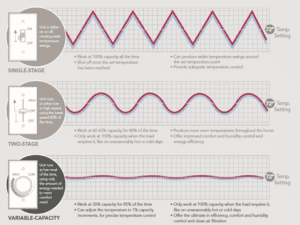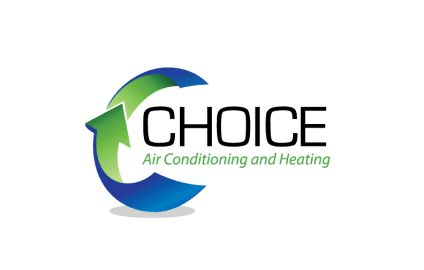FREQUENTLY ASKED QUESTIONS
Find quick answers to your HVAC questions. Explore our maintenance plans, emergency services, and energy-saving tips to ensure your home stays comfortable all year. Our expert team is ready to assist you.
How often should I change my filter?
For a 1-inch filter, change it once a month. For a 2-inch filter, change it every other month. For a 4-inch filter, change it every 6 months. If you have pets that shed, you should change your filter twice as often.
What type of filter should I use?
We recommend using a MERV rated filter. MERV stands for Minimum Efficiency Reporting Value. MERV ratings range from 1–20. The higher the MERV rating on a filter, the fewer dust particles and other contaminants can pass through it. Not all systems can function properly with a MERV 20, we generally stick between a minimum of 8 and a max of 13 for residential applications. Contact us for help finding your right fit.
What is the best temperature to keep my thermostat at?
Whatever temperature is comfortable for you. We encourage comfort heating and cooling. If you are looking for energy cost savings adjust the thermostat so it runs less, the more the unit runs the more it will cost in utilities. General comfort ranges we find most customers use are 72 degrees to 80 degrees in the summer and 60 degrees to 78 degrees in the winter. If you would like help in lowering your energy use please contact us.
Should I turn off my AC while I’m at work or on vacation?
NO. It costs more in utilities to start a unit from off than it does to maintain a steady temperature. If you would like to raise or lower the temperature while you are at work, we suggest you do not do more than 3 degrees different. When going on vacation for an extended period of time it’s not recommended to turn the ac above 85 degrees in the summer or below 45 degrees (or whatever your lowest thermostat setting is) during the winter, the main purpose there is to prevent pipes from freezing.
Do I need annual maintenance on my system?
Yes! A unit that is properly maintained is up to 30% more efficient than an unmaintained unit. When everything is working properly, it actually costs you less in utilities and overall maintenance.
Can I close registers in rooms I am not using/occupying?
Yes and No. If it’s one room, you’re probably OK. If you have a small house or want to close off multiple rooms, it’s best to call us for an evaluation. AC units need to “breath,” so affecting the airflow in your house can negatively affect their performance.
What is a safety overflow switch and why do I need one?
When it’s humid inside your AC unit produces condensation, which flows into a drain pan and through a tube to the outside. A safety overflow switch prevents the condensation from backing up when the tube gets clogged. This helps prevent water damage and is especially beneficial for people with roof units or where units are installed near drywall.
What size unit do I need?
We can give you a “rule of thumb” answer based off square footage, approx. 400 sq ft per ton of cooling. The proper way to determine sizing is to do a Manual J calculation. This is a heat load calculation that will accurately calculate the tonnage of unit your home needs. It is also required by the state of AZ to obtain a permit for your new AC unit.
I’m putting an addition on my home. Can I just tie into my existing ductwork?
It depends! How large is the addition? How large is your AC unit? Is the addition in full sun most of the day (west facing)? Does it have a lot of windows? We’re happy to come out for an evaluation so we can recommend the best course of action.
Why is my utility bill so high?
If your bill has recently changed, there may be a variety of reasons why. We most often look at the AC unit first since it is usually the biggest power draw in residential homes. Call us at 520-498-2432 to schedule an appointment. We’ll take care of you as quickly as possible.
What is the best brand?
Much of this depends on your personal preferences. We prefer Amana because they have the best warranty available. We’ve also visited their plant in Houston, TX, and seen how the units are made. Their testing standards and customer service are exceptional.
When it comes to mini splits, you can’t beat Mitsubishi. They make the most efficient and reliable units. As Mitsubishi Diamond Dealers, we can get you a 12-year warranty (instead of the standard 7-year).
What is two-stage cooling/heating and what are the benefits?
Do noisy HVAC units drive you crazy? Two-stage units are systems that can quietly run at either Low speed or High speed. The benefit is that Low speed is much more cost effective to run. It will kick into High speed if you’re having a party and need to cool the home to make it more comfortable. By default, it runs at Low speed most of the time for maximum efficiency.
What is the difference between a fixed speed and variable speed fan?
A fixed speed fan runs at a medium level all the time. A variable speed fan takes advantage of the cool or hot air that remains in your unit after it turns off. At a low speed, it draws out that air and disperses it throughout your house. It’s like getting an extra round of hot or cool air without the unit having to run as much.
What is Inverter technology?
Amana brand’s legacy of energy efficient cooling systems continues with Comfort Speed Inverter Technology. Simply stated, this technology functions much like a dimmer switch to a light bulb. The power and speed levels are adjusted automatically to use the least amount of energy required to maintain the temperature set on the thermostat. When more power or speed is needed, the inverter technology increases the performance. After the set temperature is achieved, the inverter technology automatically calculates the lowest amount of energy required to maintain your indoor comfort. The result is lower utility bills compared to single-speed compressors and constant indoor comfort because the compressor is not operating at full capacity every time it is activated. See graph below for more details.

What is SEER/EER and which is the best option?
SEER stands for Seasonal Energy Efficiency Ratio and EER stands for Energy Efficiency Ratio. Most manufacturers go off of SEER ratings, which is a measure of how much energy your unit requires to run. The higher the SEER rating, the less energy your unit needs to run. The standard for minimum efficiency is set by the government and is currently 14. Effective January 2023, the minimum standard will be a SEER of 15.
